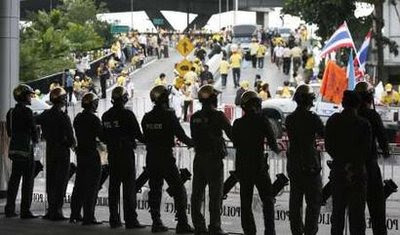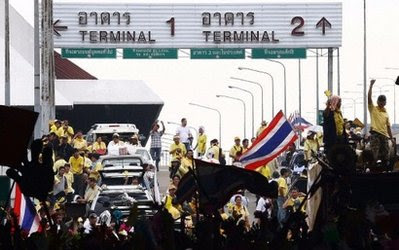25-11-2008
Ha Noi — A high-ranking delegation from the Kingdom of Cambodia led by Samdec Chea Sim, Chairman of the Cambodian People’s Party and President of the Senate, is expected to arrive in Ha Noi today.
The visit, scheduled for November 25-27, is being made at the invitation of the Central Committee of the Communist Party of Viet Nam. It follows King Norodom Sihamoni’s visit to Viet Nam in June and Prime Minister Hun Sen’s visit in November this year.
Historically, friendship and comprehensive co-operation between Viet Nam and Cambodia have been further strengthened in line with the motto "fine neighbourliness, traditional friendship, comprehensive co-operation, and long-term sustainability" as agreed on by the leaders of the two countries.
This visit by Samdec Chea Sim aims to continue contributing to the strengthening of the relations of mutual trust and understanding between leaders and peoples of the two countries, consolidating Viet Nam-Cambodia comprehensive co-operation.
By implementing agreements reached by the leaders of the two nations, Viet Nam-Cambodia relations have continued to develop. Two-way trade has seen positive developments, reaching almost US$1.2 billion last year.
Viet Nam is now Cambodia’s fourth largest trade partner, while Cambodia is Viet Nam’s 16th biggest export market. The two governments have unanimously agreed to increase two-way trade to over $2 billion in 2010.
Regarding border issues, the two sides are striving to complete land border demarcation and marker planting in 2012. They have been co-operating well in managing and maintaining security in both land and sea border areas.
They are also implementing strong co-ordination at ASEAN, ACMECS, GMS, UN and other regional and international forums.
Viet Nam continues to affirm a consistent policy to maintain good neighbourliness, solidarity, traditional friendship and comprehensive co-operation for long-term sustainability with Cambodia, and believes that this visit by Samdec Chea Sim will help bilateral ties further develop and bring benefits to the two peoples. — VNS
Ha Noi — A high-ranking delegation from the Kingdom of Cambodia led by Samdec Chea Sim, Chairman of the Cambodian People’s Party and President of the Senate, is expected to arrive in Ha Noi today.
The visit, scheduled for November 25-27, is being made at the invitation of the Central Committee of the Communist Party of Viet Nam. It follows King Norodom Sihamoni’s visit to Viet Nam in June and Prime Minister Hun Sen’s visit in November this year.
Historically, friendship and comprehensive co-operation between Viet Nam and Cambodia have been further strengthened in line with the motto "fine neighbourliness, traditional friendship, comprehensive co-operation, and long-term sustainability" as agreed on by the leaders of the two countries.
This visit by Samdec Chea Sim aims to continue contributing to the strengthening of the relations of mutual trust and understanding between leaders and peoples of the two countries, consolidating Viet Nam-Cambodia comprehensive co-operation.
By implementing agreements reached by the leaders of the two nations, Viet Nam-Cambodia relations have continued to develop. Two-way trade has seen positive developments, reaching almost US$1.2 billion last year.
Viet Nam is now Cambodia’s fourth largest trade partner, while Cambodia is Viet Nam’s 16th biggest export market. The two governments have unanimously agreed to increase two-way trade to over $2 billion in 2010.
Regarding border issues, the two sides are striving to complete land border demarcation and marker planting in 2012. They have been co-operating well in managing and maintaining security in both land and sea border areas.
They are also implementing strong co-ordination at ASEAN, ACMECS, GMS, UN and other regional and international forums.
Viet Nam continues to affirm a consistent policy to maintain good neighbourliness, solidarity, traditional friendship and comprehensive co-operation for long-term sustainability with Cambodia, and believes that this visit by Samdec Chea Sim will help bilateral ties further develop and bring benefits to the two peoples. — VNS






















